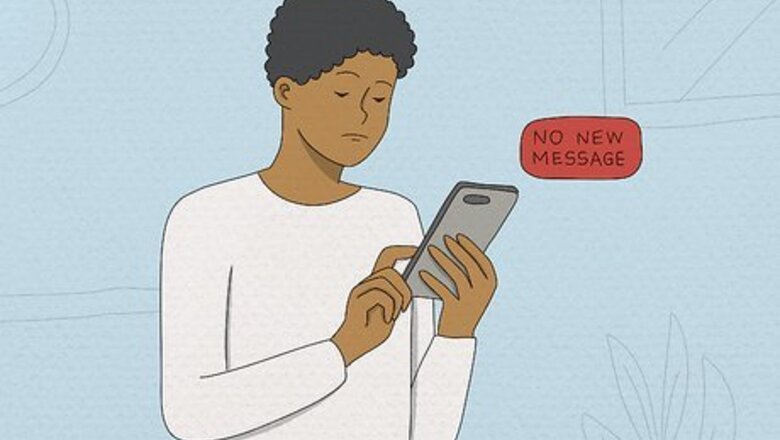
views
Signs of Avoidant Behavior
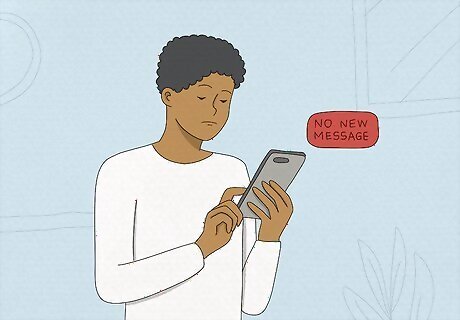
Take note if they suddenly drop all contact with you. A major sign of avoidance is a person who won't communicate with you, even sporadically. They might stop reaching out to you via email, text message, and social media and may not even bother to talk to you in person. This can even happen with someone you’re friendly or romantically linked to; when they’re avoiding you, they won’t instigate any contact. Remember that your friend may want to see you but might just be busy. They might say, "I’m sorry I haven't returned your calls. I'm so busy with school right now. Let's get together next week when I have time." However, if you keep getting these messages week after week (or get no message at all) then they may be trying to avoid you.
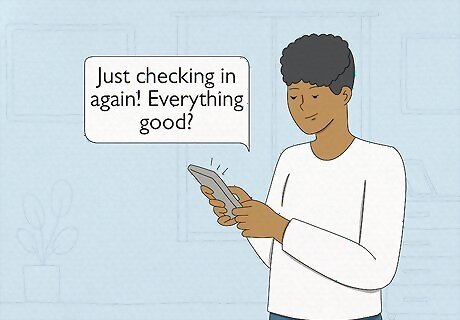
Send the person a message to see if they respond. When you send someone a simple check-in text, and they don’t respond for a few days, it might mean they don’t want to talk to you. Try again once more if you don’t hear back; if they don’t respond the second time, don’t keep pushing the issue. Respect their reasons for avoiding you—because continuing to reach out may make matters worse. For your first message, you could send something like, “Hey! What’s up?” If they don’t respond, follow up with something easygoing like, “Just checking in again! Everything good?” If the messaging service you’re using shows you when a recipient reads your message, use that to gauge whether you're being ignored. A lack of response indicates that they likely aren't interested in a message conversation. If you know your friend doesn't visit Facebook often, it might be totally normal for them to miss your message. However, if they're always on Facebook and still don't respond to your message, they're likely avoiding you.
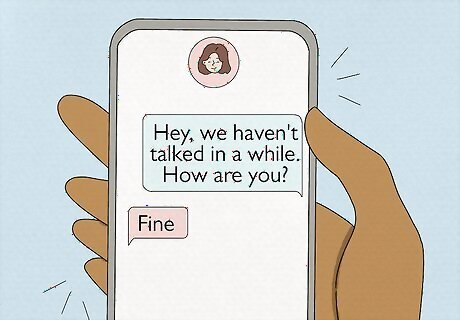
Look for short, disengaged answers in conversations and texts. Try to start a conversation with this person and notice their attitude. If they seem uninterested and give you short, monotone answers, it can be a sign of avoidance. They may be deflecting your questions so that they can slip away quickly. Similarly, observe any text replies you get; they’ll likely use 1-word responses if they want to avoid you. For example, if you say, "Hey, we haven't talked in a while. How are you?" they say, "Fine," and walk away, this could indicate that your friend is avoiding you. Similarly, if you text them, “Omg, someone asked me on a date!” and they reply, “Cool,” without following up or saying anything else, they might be distancing themself from you.
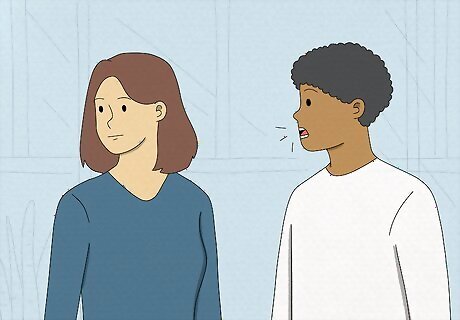
Watch them to see if they avoid eye contact with you. If they’re trying to stay away from you, odds are they’ll try not to make eye contact—and if they do, it may be extremely brief, or they may roll their eyes after they look away. The next time you’re around this person face to face, try to look them in the eyes. If they immediately look away or refuse to look at you entirely, it may mean they’re avoiding you. They may also use closed-off and unfriendly body language if they're avoiding you. You might notice them look down at their feet or stand further away from you than they do other people, for example. If they won’t meet your eyes, ask yourself whether that was something they used to do. If they used to make eye contact all the time and now they don’t, that’s another big sign they’re avoiding you.

See if they’re cold and distant when you talk in a group setting. Avoidance doesn't necessarily mean that someone won't spend time with you; sometimes it means they don't acknowledge your presence. If they make a point to talk to everyone except for you, they might be avoiding you. Say something directly to them; if their response is quick and curt (or nonexistent), that’s another sign of avoidance. Notice whether the person leaves the room when you enter. If this happens consistently, it’s another indication that they don't want to spend time with you. Compare this treatment to how the person acts one-on-one. Perhaps they only "avoid" you in group settings, or quickly slip away once it's just the two of you. It may help to see if they do this with other people, too.
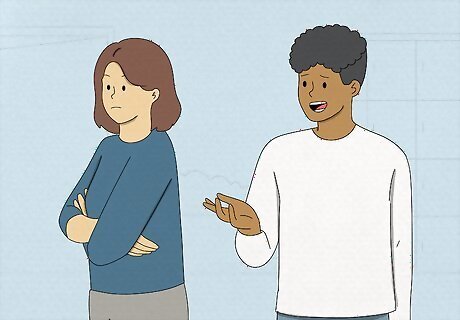
Consider whether they care about your thoughts or opinions. If they don't ask for your input in friendly discussions or show any curiosity about what you're thinking, it may mean they're trying to ignore you. They may try to skip over you when asking others about their day, avoid asking you how you feel about a decision, or even ignore you when you share your perspective.

Recognize when they always have an excuse to get out of plans. They might keep blaming their busy work schedule or hectic social life, or maybe something always seems to "come up.” If a person continually finds reasons to back out of plans, there's a chance that they’re avoiding you rather than being genuinely busy or unavailable. Don't be too harsh. Things do "come up," and they might really feel overwhelmed by their hectic schedule. Excuses are signs of avoidance, but they don’t necessarily mean the person doesn't want to spend time with you.
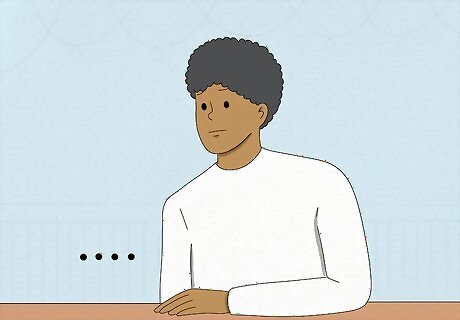
Take note when they start canceling plans at the last minute. Does this person still value their commitments to you? If they’re avoiding you, they might develop a habit of telling you something came up at the last minute every time you’re supposed to spend time together. Alternatively, they might not even give you the courtesy of canceling; they may simply fail to show up every time you make plans. Last-minute cancellations can happen, but it’s unlikely that emergencies are actually popping up every time you’re supposed to hang out together. If this becomes a pattern, it might be a red flag.

Keep your distance from anyone who might be stringing you along. Ask yourself whether you’re a priority to a person you’re dating; they might be avoiding you because they want to keep you on the hook without committing to anything. They might ask you to "go with the flow" and become evasive when you ask them for commitment. Other signs that they’re using you include: The relationship doesn't progress. Instead, it may stagnate (so nothing ever changes between you), or it may actually hold you back and have a negative impact on your well-being. Your significant other is only around when they want something from you. They might ask for money, attention, sex, or a sympathetic ear to talk to—and then disappear when they get what they want. They may only ask to spend time with you at the last minute, showing up at your door or texting you late at night without even trying to make plans. If you don't feel a connection by the third date, it might be a hint that you’re not very interested in one another.
Understanding Avoidant Behavior
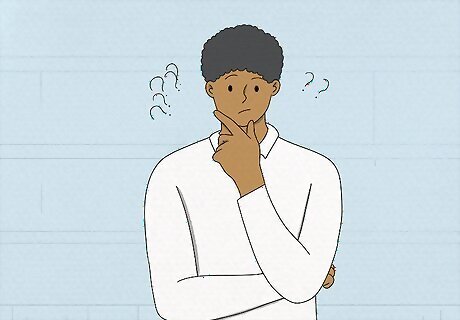
Ask yourself why this person might be avoiding you. For example, perhaps you had an argument or a falling out. Maybe you said something to offend them without realizing it, or you inadvertently made them uncomfortable in some way. Carefully reflect on your recent behavior around this person and try to identify a specific reason for their avoidant behavior.

Look for patterns in their behavior to figure out why they avoid you. Whenever you feel like someone is avoiding you, examine the situation and search for common threads between them. Maybe this person avoids you at certain times or while around particular people—they might be doing it for reasons that don’t even involve you. Once you spot the pattern, you might realize why they’re doing it. For example, if they tend to avoid you around one of your friend groups, maybe they actually don’t like those people. Alternatively, maybe they’re shy and feel lost in large groups. Maybe they’ve been avoiding you when they’re trying to work or study. Your friend might love to spend time with you in a social setting but find it hard to concentrate while you're around.
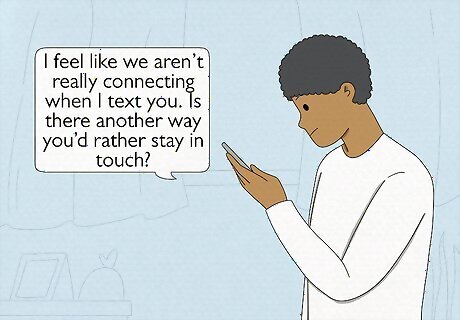
Consider whether they might prefer communicating differently. For example, if they’re present and engaging in person but never respond to your texts, the real issue might be that they don’t like communicating over text. Try asking them what method of communication they actually prefer. If they have a busy schedule, it can be difficult to take the time for a deep, involved text conversation when they’re working or studying. You could say something like, “I feel like we aren’t really connecting when I text you. Is there another way you’d rather stay in touch?” Remember that there are tons of ways to communicate nowadays, from good old-fashioned phone calls to texts, app messaging, video calls, and more. Odds are, you'll find a way to stay in touch that both of you like.

Reflect on how they may have changed since they began avoiding you. Perhaps they started hanging out with a new group of friends, or they're busy with a new hobby that isn't really your thing. Being close to someone is a wonderful thing, but people change over time and sometimes drift apart. If you can tell someone is moving on, it might be time for you to move on, too. Remember that people grow apart for a variety of reasons, and sometimes it’s nobody’s fault. Consider how you’ve changed as well. Maybe this person acts the same as always, but you’ve begun to act differently. For example, you might be spending a lot of time with a new significant other, or maybe you’ve picked up a new habit that bothers your friend. Growing apart doesn’t mean you can't grow back together. You can always choose to let a person go or try to keep the relationship alive. Be aware, however, that this process must be mutual.
What to Do When Someone Avoids You

Put a little space between yourself and the person avoiding you. They may simply need to walk their own path for a while before they’re ready to reconnect with you. In many cases, forcing a connection will only push the avoidant person further away. Be patient, give yourselves space, and move on with your life in the meantime. If they decide they want to be in your life, they’ll let you know. Be clear about your intentions. Say, "It seems like you need some space right now, so I'm going to leave you alone. If you ever want to talk, my door's always open." Keep your heart open. It can be difficult to move on with your life and remain open to the idea of reuniting with this person. Take a step back from the relationship, remember the good times, and try to let go of any anger.
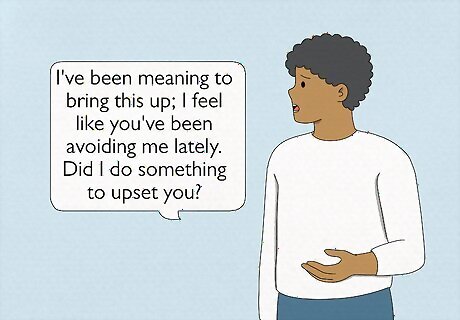
Talk to them honestly and tactfully about why they may be avoiding you. Whether you feel like you may have done something wrong or you suspect your friend is going through a hard time, calmly ask them if they're really avoiding you. Be respectful and direct as you explain what's bothering you. Direct communication is important; until you ask, it’s impossible to know for sure if there’s a problem. You could say something like, “I've been meaning to bring this up; I feel like you've been avoiding me lately. Did I do something to upset you?" If you know why someone is avoiding you, don't beat around the bush. Apologize if you’ve done something to upset them and try to resolve the issue. For example, you could say, “I feel like things have been awkward since our fight last week. I value our friendship a lot, and I’m sorry for upsetting you. Can we talk this out? This argument isn't worth ruining our friendship." Either confront them one-on-one or ask a guidance counselor to moderate the conversation. Consider your comfort level and choose the option that works best for you.

Be prepared for them to play dumb if you ask them about it. In some cases, a person who is avoiding you might make the situation more confusing by pretending not to know what you’re talking about if you bring it up. They may be trying to change the subject and avoid the discussion (and you) by playing dumb. If they won’t own up to what’s happening or come clean with you, they’re likely avoiding you. For example, if you say, “I feel like there’s been some distance between us lately,” and they respond, “Well, I don’t know what you mean by that,” they might be trying to deflect and avoid you. Remember not to be angry or accusatory when you bring it up. There’s always a chance they might genuinely be unaware of what’s going on and surprised to hear that you feel like there’s a rift between you.

Ask a mutual friend for insight on why they’re avoiding you. If you have mutual friends with the person who is avoiding you, someone trustworthy could weigh in on the situation. Just keep in mind that spreading rumors or gossip will only inflame the situation further. Be careful about what you say and avoid negative remarks, just in case the avoidant person hears about it. You could say something like, "Do you have any idea why Jo would be upset with me? I feel like they've been avoiding me lately."

Accept the outcome of the confrontation no matter what happens. You might be able to reconnect with this person, or you might end up going your separate ways. Be prepared to let go of the relationship if you can’t reconnect. Giving up on someone you’ve invested time and energy in isn’t easy, but it’s important to accept that things may not go back to the way they were. Letting go and moving on is a matter of growth and emotional well-being. If you dwell on what once was and could have been, it’ll be impossible to learn and bloom in the present. Letting go doesn’t mean forever. You may still rekindle a friendship with this person someday. It simply means there’s no use spending valuable emotional energy on someone who isn't open to it right now.
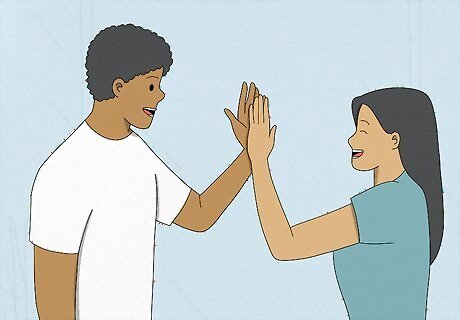
Take care of yourself and invest in healthy, respectful relationships. You can’t force someone to stop avoiding you, so sometimes the best solution is to refocus on healthy relationships that make you feel good about yourself. Give yourself time to heal from the negative relationship, put extra effort towards self-care, and remind yourself how much you appreciate the healthy, happy friendships you do have. It’s important to surround yourself with people who support you, respect you, and appreciate you for who you are. If the avoidant person isn’t doing that, it may be time to look for people who can.


















Comments
0 comment